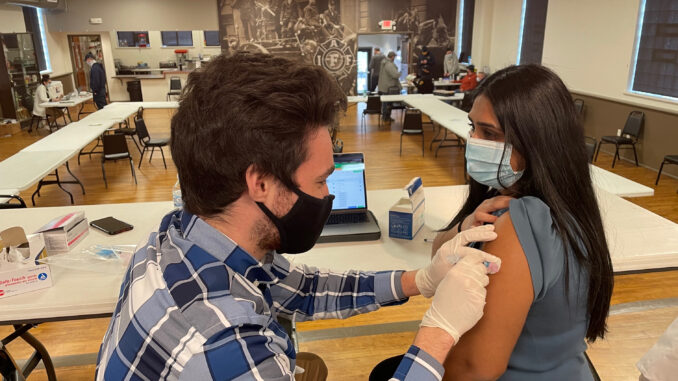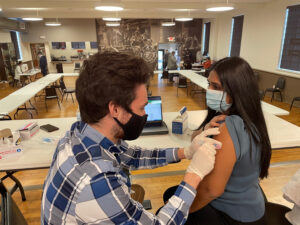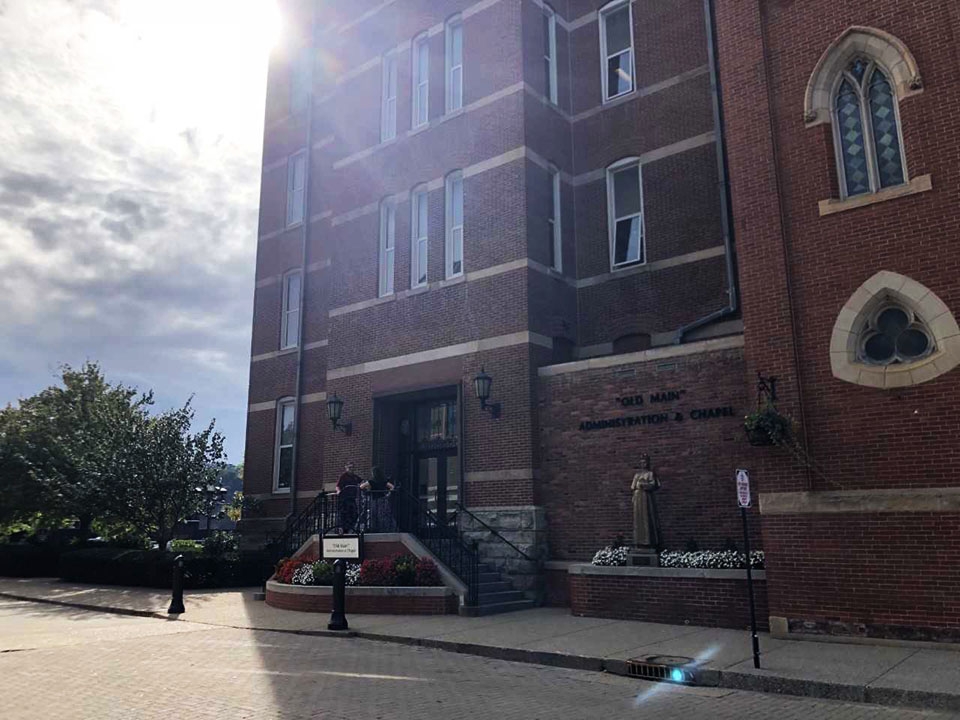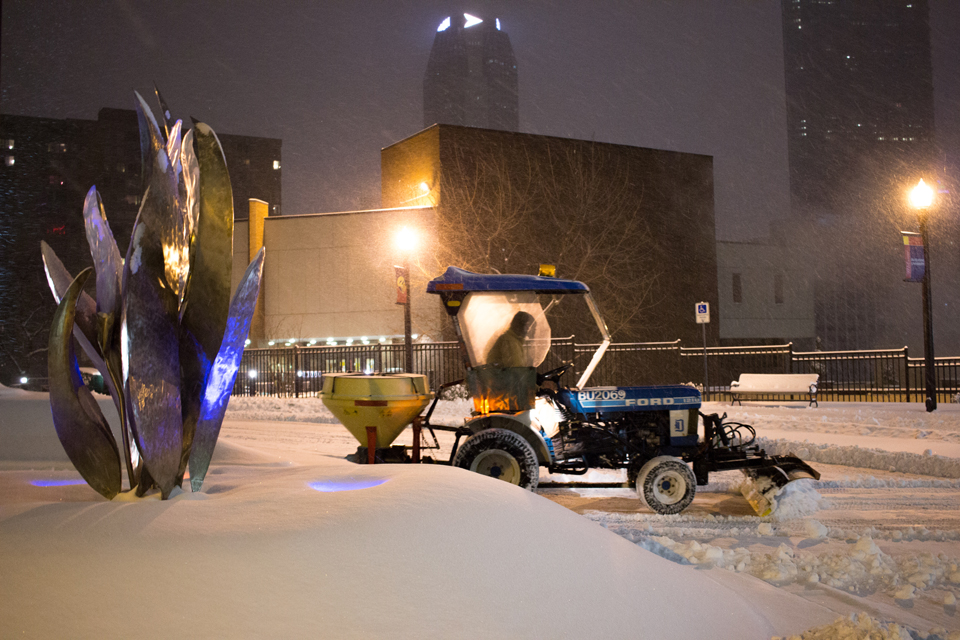
Kellen Stepler & Zoe Stratos | The Duquesne Duke
1/28/2021

Pharmacy students, although typically not allowed to administer vaccines, have been given emergency training and special authorization from Gov. Wolf to assist
in the COVID-19 vaccination efforts. Over 300 Duquesne pharmacy students have been trained and are now certified to administer the vaccine.
Levi DeBlase knew that as a pharmacist, giving vaccines was in the job description.
He didn’t realize that he would be administering life saving vaccines to combat a pandemic — all as a student pharmacist.
DeBlase is currently one of 322 Duquesne pharmacy students that have completed the pharmacy-based immunization training certificate. By Jan. 29, 115 additional pharmacy students will have been trained to give the vaccine, accord- ing to pharmacy professor Tiffany Hatcher.
“Typically, we provide the training to students during their second professional year of pharmacy school; however, this year we have added new opportunities for first year professional students to be trained,” Hatcher said.
Duquesne pharmacy students have been able to step up and fill the role of vaccine administrators through the immunization certificate. According to the Pennsylvania Department of State, pharmacy interns who have completed the required education and are under strict supervision of a licensed pharmacist who holds an “active authorization to administer injectable medications,” are now able to temporarily administer COVID-19 vaccinations to people ages 18 and up.
Previously, in Pennsylvania, student pharmacists and interns were not allowed to vaccinate as an intern until December. On Dec. 14, Gov. Tom Wolf signed a waiver allowing supervised students and interns to administer flu and COVID-19 vaccines.
“Because of COVID-19, we’re getting this opportunity that we wouldn’t normally get,” DeBlase, a fifth-year pharmacy student, said.
It’s a “once in a lifetime” opportunity, Hatcher said, for student pharmacists to support the community in the midst of a pandemic, and to practice at the top of their pharmacy intern license.
“Students will have gained valuable experience under the supervision of a pharmacist providing vaccinations,” Hatcher said. “Additionally, students will have meaningful patient care experiences that will allow them to grow into a compassionate, caring, clinically-confident professional.”
Duquesne’s school of pharmacy regularly provides vaccination courses, but the COVID-19 pandemic has forced the program to go to online learning.
“Initially, we were unsure as to how the training process would work virtually; however, it has been a great success,” Hatcher said. “For students, it allows for them to be able to start the didactic portion of the content without having to be on campus.”
Some objectives of the training, Hatcher noted, were to educate patients about the benefits of vaccines — and dispel myths — and to safely administer vaccines to patients via subcutaneous, intramuscular, intranasal and intradermal routes.
“Training is split up into two parts and the APHA [American
Pharmacist Association] uses this training for pharmacists in any state,” said Natalie Klek, a professional first-year pharmacy student. “First, you do 12 hours of self-study, you know, reading how and when to give the vaccine. The second is a live eight-hour class where they repeat what you learned in self-study and then learn to do it.
Klek explained that “the first is two practice shots are intramuscular — the normal flu shot — and one subcutaneous — the chicken part of the arm.”
Shortly after Klek’s certification, she began to administer vaccines at clinics in the area organized through an independent pharmacy. Other pharmacy students are eager to get out into the field and begin administering, like professional year two pharmacy student, Maci Egger.
“We all are willing to give our
time and we’re looking forward to doing it,” Egger said. “Not only are we helping the community, but we’re also getting practice for the future that we normally wouldn’t get.”
David Rogers, a fifth-year pharmacy student, has participated in clinics since early January, and said he plans on doing it as much as he can.
“It’s an experience and a practice that you wouldn’t normally have,” Rogers said. “It’s a great opportunity to give back to people.”
According to the Pennsylvania Department of Health, 770,965 doses of the vaccine have been administered statewide through Jan. 26.
Being able to help administer the vaccine, according to pharmacy student Julian Kleberg, was historic. Kleberg volunteered at a clinic in Peters Township last weekend.
“It was a really good experience,” Kleberg said. “The people I vaccinated were really appreciative — some people were crying. It’s good to be a part of history.”
Pennsylvania is currently in phase 1A of the vaccine rollout: vaccinating those most high-risk of illness, such as health care workers and residents of long- term care facilities, people age 65 and older and those with high-risk conditions.
During the week of Jan. 17, clinical students and faculty were able to receive the first round of vaccinations in the Power Center Ballroom.
Hosted by the Center for Pharmacy Care, certified student pharmacists were able to volunteer to either administer vaccines or help with other tasks like screening, according to a Face- book post by professional year 2 pharmacy student, Katie Grenell.
Duquesne received 700 doses of the vaccine; 350 for clinical students and faculty at Duquesne and 350 for clinical students and faculty at CCAC, according to Vice President for Marketing and Communications, Gabriel Welsch. The second round of vaccinations are soon to follow once the health department sends them to Duquesne.
Between the successful clinic held earlier this semester, and the hundreds of pharmacy students certified to administer the vaccine, Duquesne is hopeful, and prepared, to receive and ad- minister the vaccine to the general student, faculty and staff population as soon as possible.
“We have all of the capabilities we need at Duquesne to receive, store and administer the vaccine,” Welsch said. “Last semester, the university made modifications and repairs to equipment to ensure we are able to store the vaccines at the temperatures required. We have ensured faculty and students in the pharmacy, nursing and health sciences have been trained to administer the vaccine. We have developed detailed plans to administer the vaccine to our population quickly once we receive the vaccine.”
As prepared as Duquesne may be, the rollout time of vaccines in Pennsylvania is less than desired. Currently, according to the New York Times’ vaccine rollout tracker, Pennsylvania ranks 42 out of the 50 states. Only 5.1% of the population has received at least one shot.
“We know that Pennsylvanians are ready for the vaccine,” Pennsylvania Acting Secretary of Health Alison Beam said in a press release. “We ask for patience as the amount of the vaccine in Pennsylvania and the nation is limited. We want to ensure that the vaccine is provided in a way that is ethical, equitable and efficient, which is why we are taking a phased approach. This way we can make sure the most vulnerable residents can get vaccinated now.”
But Duquesne continues to lobby for vaccine doses to be allocated to all students, faculty and staff, and has done so since the early stages of the pandemic.
“Duquesne’s leadership is in regular communication about the pandemic with policymakers at the local, state and federal levels,” Welsch said. “We have communicated with governmental leaders the need to vaccinate our population as soon as possible. We look forward to receiving additional doses of the vaccine in the upcoming days and weeks.”
With more populated clinics becoming available in the future, Duquesne pharmacy student Amy Patel — who has already served in over 10 clinics in the Pittsburgh area — said that the opportunity to help administer the vaccine is a good way to put her skills to use in the community.
“It’s a pretty exciting and re- warding experience,” Patel said. “I’ve grown as a person and as a pharmacy student.”




